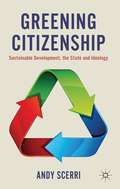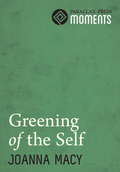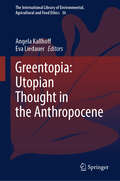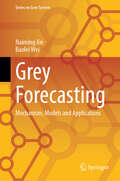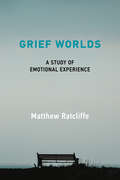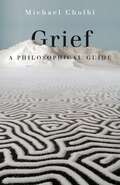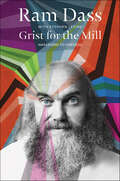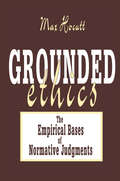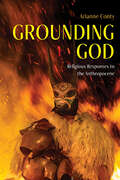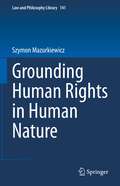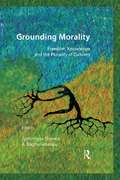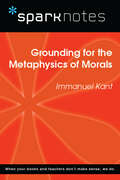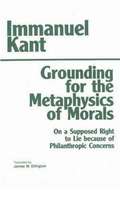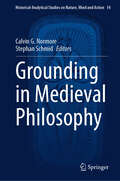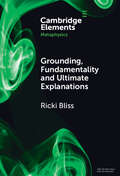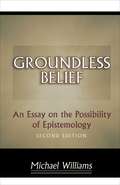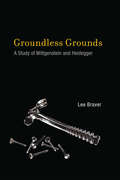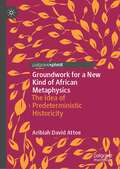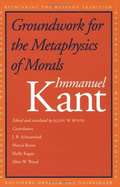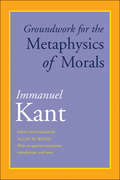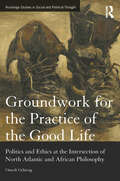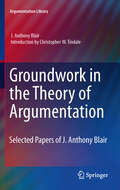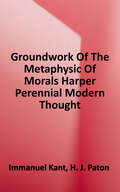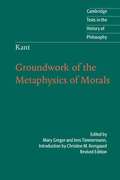- Table View
- List View
Green: The History of a Color
by Michel PastoureauIn this beautiful and richly illustrated book, the acclaimed author of Blue and Black presents a fascinating and revealing history of the color green in European societies from prehistoric times to today. Examining the evolving place of green in art, clothes, literature, religion, science, and everyday life, Michel Pastoureau traces how culture has profoundly changed the perception and meaning of the color over millennia—and how we misread cultural, social, and art history when we assume that colors have always signified what they do today.Filled with entertaining and enlightening anecdotes, Green shows that the color has been ambivalent: a symbol of life, luck, and hope, but also disorder, greed, poison, and the devil. Chemically unstable, green pigments were long difficult to produce and even harder to fix. Not surprisingly, the color has been associated with all that is changeable and fleeting: childhood, love, and money. Only in the Romantic period did green definitively become the color of nature.Pastoureau also explains why the color was connected with the Roman emperor Nero, how it became the color of Islam, why Goethe believed it was the color of the middle class, why some nineteenth-century scholars speculated that the ancient Greeks couldn't see green, and how the color was denigrated by Kandinsky and the Bauhaus.More broadly, Green demonstrates that the history of the color is, to a large degree, one of dramatic reversal: long absent, ignored, or rejected, green today has become a ubiquitous and soothing presence as the symbol of environmental causes and the mission to save the planet.With its striking design and compelling text, Green will delight anyone who is interested in history, culture, art, fashion, or media.
Greening Citizenship
by Andy ScerriThe greening of citizenship, the state and ideology has created both opportunities and bottlenecks for progressive political movements. Scerri argues that these are pursuing justice by making holistic demands for: fair distribution and status recognition, adequate representation and effective participation.
Greening of the Self
by Joanna MacyThe premise of Greening of the Self is that we are not individuals separate from the world. Instead we are always "co-arising" or co-creating the world, and we cannot escape the consequence of what we do to the environment. Joanna Macy's innovative writing beautifully demonstrates that by broadening our view of what constitutes "self" we can cut through our dualistic views and bring about the emergence of the "ecological self", that realizes that every object, feeling, emotion, and action is influenced by a huge, all-inclusive web of factors. Any change in the condition of any one thing in this web affects everything else by virtue of interconnectedness.Greening of the Self is visionary and future-oriented, making it essential reading for anyone who wants to discover the knowledge authority and courage to respond creatively to the crises of our time.Based on a chapter in Joanna Macy's bestselling World as Lover, World as Self.
Greentopia: Utopian Thought in the Anthropocene (The International Library of Environmental, Agricultural and Food Ethics #36)
by Angela Kallhoff Eva LiedauerGreentopia: Utopian Thought in the Anthropocene provides new ways of imagining the future interface between society and non-human nature and brings into focus the possibility of a peaceful coexistence. “Greentopia” is a mode of thought that takes us beyond mourning environmental degradation and ecological catastrophe. The absence of already-paved paths in the area gives space for a variety of experiments in thinking. The book interprets its subject, “Greentopia”, as a method of re-imagination, yet also as a very concrete practice. It brings together researchers from different areas to investigate environmental utopia from their respective angles. The present volume is of highest interest for environmental ethicists, but also of interest for anyone involved in current discourses on utopianism, life in the Anthropocene, environmental crises, the future of agriculture and green cities.
Grey Forecasting: Mechanism, Models and Applications (Series on Grey System)
by Naiming Xie Baolei WeiThis book aims to present an overview of grey system models for time series modelling and forecasting. It is about modelling and forecasting time series with ordinary differential equations, especially when the available samples are extremely limited. Grey system models (GSM) develop sequence operators to nonparametrically identify the underlying dynamics from the limited observations. This book concerns about two important modelling themes, small sample and poor information. The former focuses on the mechanism and methodology of GSMs for small-sample real-number time series, and the latter on the uncertainty quantification of grey number together with its small-sample modelling principles. In this book, a broad entry point to applied data science for students majoring in economic, management science, and engineering is applied, covering a wide range of topics from basic introductory material up to research-level techniques.
Grief Worlds: A Study of Emotional Experience
by Matthew RatcliffeA wide-ranging philosophical exploration of what it is to experience grief and what this tells us about human emotional life.Experiences of grief can be bewildering, disorienting, and isolating; everything seems somehow different, in ways that are difficult to comprehend and describe. Why does the world as a whole look distant, strange, and unfamiliar? How can we know that someone is dead, while at the same time find this utterly unfathomable, impossible? Grief Worlds explores a host of philosophical questions raised by grief, showing how philosophical inquiry can enhance our understanding of grief and vice versa.Throughout the book, Matthew Ratcliffe focuses on the phenomenology of grief: what do experiences of grief consist of, how are they structured, and what can they tell us about the nature of human experience more generally? While acknowledging the diversity of grief, Ratcliffe sets out to identify its common features. Drawing extensively on first-person accounts, he proposes that grief is a process that involves experiencing, comprehending, and navigating a pervasive disturbance of one&’s experiential world. Its course over time depends on ways of experiencing and relating to other people, both the living and the dead. Along with its insights into the workings of grief, the book provides us with a broader philosophical perspective for thinking about human emotional experience.
Grief: A Philosophical Guide
by Michael CholbiAn engaging and illuminating exploration of grief—and why, despite its intense pain, it can also help us growExperiencing grief at the death of a person we love or who matters to us—as universal as it is painful—is central to the human condition. Surprisingly, however, philosophers have rarely examined grief in any depth. In Grief, Michael Cholbi presents a groundbreaking philosophical exploration of this complex emotional event, offering valuable new insights about what grief is, whom we grieve, and how grief can ultimately lead us to a richer self-understanding and a fuller realization of our humanity.Drawing on psychology, social science, and literature as well as philosophy, Cholbi explains that we grieve for the loss of those in whom our identities are invested, including people we don't know personally but cherish anyway, such as public figures. Their deaths not only deprive us of worthwhile experiences; they also disrupt our commitments and values. Yet grief is something we should embrace rather than avoid, an important part of a good and meaningful life. The key to understanding this paradox, Cholbi says, is that grief offers us a unique and powerful opportunity to grow in self-knowledge by fashioning a new identity. Although grief can be tumultuous and disorienting, it also reflects our distinctly human capacity to rationally adapt as the relationships we depend on evolve.An original account of how grieving works and why it is so important, Grief shows how the pain of this experience gives us a chance to deepen our relationships with others and ourselves.
Grist for the Mill: Awakening to Oneness
by Ram Dass Stephen LevineFrom the bestselling author of Be Here Now. “A challenging and enlightening collection of speeches and lectures by Ram Dass on his spiritual journey.” —Spirituality & PracticeFrom Ram Dass, one of America’s most beloved spiritual figures and bestselling author of Be Here Now and Be Love Now, comes this timeless classic about the experience of being and the risks and rewards of our spiritual path. Originally published in 1976, Grist for the Mill offers a deep spiritual journey of self-discovery, and a universal understanding of what it means to “be” and to grow as human beings. The book is fully revised with a new introduction.As Ram Dass puts it, “When the faith is strong enough it is sufficient just to be. It’s a journey towards simplicity, towards quietness, towards a kind of joy that is not in time. It’s a journey that has taken us from primary identification with our body and our psyche, on to an identification with God, and ultimately beyond identification.”Praise for Ram Dass“One of our greatest teachers.” —Deepak Chopra“There’s no way to overestimate the role of Ram Dass.” —Marianne Willliamson“May Ram Dass inspire others to find their own path of true love, compassion, and joyful service.” —Thich Nhat Hanh
Grounded Ethics: The Empirical Bases of Normative Judgements
by Max HocuttScientific naturalism--basing beliefs on empirical evidence--has now triumphed in every field of inquiry except moral philosophy. There it is still thought appropriate to cite otherworldly standards known by divine revelation or moral intuition. In Grounded Ethics Max Hocutt argues that, since there is no transcendent reality on which to base the claims of ethics, normative truth must be sought in the desires of individuals and the conventions of societies.Hocutt begins with an empiricist analysis of normative judgments. Following B.F. Skinner, he asserts that we call good what reinforces our desires, and that we call right or just what we desire to reinforce. Consequently, desire is the immediate measure of both goodness and justice. Acknowledging that goodness is relative to individual preferences, and justice is relative to social norms, Hocutt denies that goodness is a matter of personal opinion and that every society's institutions are as good as every other's. Instead, he says, the conduct of individuals and the customs of societies must ultimately be evaluated by how well they serve biologically based needs. These must be discovered empirically, because they cannot be known a priori.In support of this analysis, Hocutt challenges rationalist belief, that normative concepts cannot be defined in empirical terms because they are rooted in divine law or ideals of pure reason. Against this view, Hocutt argues that if the moral law exists only as an ideal, it is not binding in the same sense as the empirically known laws and moralities of actual societies. He also points out that rationalist intuitions are best understood as expressions of animal instinct, socially conditioned prejudice, and personal preference. In addition, he offers extensive critiques of major philosophers, both ancient and modern, who hold contrary views.All of this is meant to show that there is no escaping the empirical: A sensible ethics must be built on observable facts; it cannot be pulled from a vague but pious rationalist sky. Hocutt's demonstration of this thesis will interest philosophers, behavioral biologists, sociologists and ethicists.
Grounding God: Religious Responses to the Anthropocene (SUNY series on Religion and the Environment)
by Arianne Françoise ContyNow that we have entered the Anthropocene, the geological age in which humans have altered the natural world to such an extent that nature and culture can no longer be separated, the modern dichotomies of mind versus body and culture versus nature have become implausible and need to be replaced. In Grounding God, Arianne Conty argues that it is in the field of religion where we can find a new ontology better suited for the Anthropocene. Conty calls this new religious ontology the grounding of the sacred, in that it seeks to deconstruct the binaries of modernity and provide in their place a revalorization of the immanent earth and the more-than-human beings that inhabit it. Such a grounding of the sacred is a potent means to overcome the exploitation and desecration of the earth and its nonhuman beings and, to provide in its stead, an inclusive cosmopolitics that extends mind into matter and culture into nature. Tracing such a grounding in the Christian, Buddhist, neopagan, and animist traditions, Conty seeks to elaborate an interdisciplinary ecosophy, one that uses philosophy, anthropology, and religious studies to provide new values for the present age.
Grounding Human Rights in Human Nature (Law and Philosophy Library #142)
by Szymon MazurkiewiczWhat does it mean that human rights derive from human dignity? And what is the foundation of human dignity? How are human dignity and its foundation connected? Is the recent development of natural sciences dealing with human nature, like evolutionary psychology, relevant to these questions? The book addresses these points by connecting the discussion on the foundations of human rights with the recent claims regarding human nature made in evolutionary psychology, and with contemporary analytic metaphysics, especially the relation of metaphysical grounding. It offers in-depth insights into the so-called naturalistic approach to human rights, together with detailed proposals on how the approach could be truly naturalized in the philosophical sense. It shows how human rights and human dignity may have foundations in natural facts about human nature and offers a detailed analysis of how the “is” / “ought” gap problematic can be solved.The book also addresses the objection of Western ethnocentrism – unlike most of the contemporary philosophical accounts of human rights, which draw on highly individualistic Western concepts, it employs concepts like altruism and cooperation.
Grounding Morality: Freedom, Knowledge and the Plurality of Cultures
by Jyotirmaya Sharma A. RaghuramarajuPut together to honour one of the most influential philosophers in recent times, Mrinal Miri, this book brings together articles on philosophy, politics, literature and society, and updates the status of enquiry in each of these fields. In his philosophical writings, Miri has broken the stranglehold that early training has on academics and written on a range of themes and areas, including analytical philosophy, political philosophy, tribal identity, ethics and, more recently, an abiding engagement with the ideas of Gandhi. The articles in this volume mirror some of Miri’s concerns and philosophical interests, but go beyond the format of a festschrift, as they seek to enhance and restate themes in moral philosophy, ethics, questions of identity, Gandhi’s philosophy, and offer a fresh perspective on themes such as secularism, religion and politics.
Grounding for the Metaphysics of Morals (SparkNotes Philosophy Guide)
by SparkNotesGrounding for the Metaphysics of Morals (SparkNotes Philosophy Guide) Making the reading experience fun! SparkNotes Philosophy Guides are one-stop guides to the great works of philosophy–masterpieces that stand at the foundations of Western thought. Inside each Philosophy Guide you&’ll find insightful overviews of great philosophical works of the Western world.
Grounding for the Metaphysics of Morals: with, On a Supposed Right to Lie Because of Philanthropic Concerns
by Immanuel Kant James W. EllingtonTranslation of: Grundlegung zur Metaphysik der Sitten: and of: Uber ein vermeintes Recht aus Menschenliebe zu lugen. This is the third edition of this volume.
Grounding in Medieval Philosophy (Historical-Analytical Studies on Nature, Mind and Action #14)
by Stephan Schmid Calvin G. NormoreThis book offers a selection of 13 case studies on how the notion of grounding helps illuminate philosophical discussions of our past with a special focus on debates of the Middle Ages. It thereby makes not only the case that the notion of grounding, which has become so widely debated in analytic metaphysics, has a long and venerable tradition, but also shows that this tradition has a lot to teach to contemporary philosophers of grounding. This is because the historical authors discussed in this volume – that is, Aristotle, Fazang, Boethius, Avicenna, Abelard, Aquinas, Scotus, Ockham, Buridan, Suárez, Leibniz, and others – suggested different types of non-efficient-causal explanations which are to be carefully distinguished. This volume illustrates how philosophy and history of philosophy can be mutually illuminating by showing that the terminology developed in the contemporary debate about grounding can help reconstruct philosophical discussions from Antiquity up to the Early Modern Period, and that these very discussions enrich, and in part challenge the contemporary debate about grounding. In this vein, it is an important reading for everyone interested in the history of grounding and the philosophical insights that this history might have left to us.
Grounding, Fundamentality and Ultimate Explanations (Elements in Metaphysics)
by Ricki BlissThere is a long lineage of philosophers concerned with coming to understand what explains everything broadly construed, or within a certain, restricted domain. We call such explanations ultimate explanations. Contemporarily, philosophers of a certain stripe have devoted much attention to the notion of fundamentality - that there is something which is without explanation. This Element explores some of the connections between fundamentality and ultimate explanations both contemporarily and historically.
Groundless Belief: An Essay on the Possibility of Epistemology - Second Edition
by Michael WilliamsInspired by the work of Wilfrid Sellars, Michael Williams launches an all-out attack on what he calls "phenomenalism," the idea that our knowledge of the world rests on a perceptual or experiential foundation. The point of this wider-than-normal usage of the term "phenomenalism," according to which even some forms of direct realism deserve to be called phenomenalistic, is to call attention to important continuities of thought between theories often thought to be competitors. Williams's target is not phenomenalism in its classical sense-datum and reductionist form but empiricism generally. Williams examines and rejects the idea that, unless our beliefs are answerable to a "given" element in experience, objective knowledge will be impossible. Groundless Belief was first published in 1977. This second edition contains a new afterword in which Williams places his arguments in the context of some current discussions of coherentism versus the Myth of the Given and explains their relation to subsequent developments in his own epistemological views.
Groundless Grounds: A Study of Wittgenstein and Heidegger (The\mit Press Ser.)
by Lee BraverAn in-depth comparison of Wittgenstein and Heidegger shows how the views of both philosophers emerge from a fundamental attempt to dispense with the transcendent.Ludwig Wittgenstein and Martin Heidegger are two of the most important—and two of the most difficult—philosophers of the twentieth century, indelibly influencing the course of continental and analytic philosophy, respectively. In Groundless Grounds, Lee Braver argues that the views of both thinkers emerge from a fundamental attempt to create a philosophy that has dispensed with everything transcendent so that we may be satisfied with the human. Examining the central topics of their thought in detail, Braver finds that Wittgenstein and Heidegger construct a philosophy based on original finitude—finitude without the contrast of the infinite.In Braver's elegant analysis, these two difficult bodies of work offer mutual illumination rather than compounded obscurity. Moreover, bringing the most influential thinkers in continental and analytic philosophy into dialogue with each other may enable broader conversations between these two divergent branches of philosophy.Braver's meticulously researched and strongly argued account shows that both Wittgenstein and Heidegger strive to construct a new conception of reason, free of the illusions of the past and appropriate to the kind of beings that we are. Readers interested in either philosopher, or concerned more generally with the history of twentieth-century philosophy as well as questions of the nature of reason, will find Groundless Grounds of interest.
Groundwork for a New Kind of African Metaphysics: The Idea of Predeterministic Historicity
by Aribiah David AttoeIt is not far-fetched to say that much of what is termed “African metaphysics” remains a traditional affair, without the sort of critical analysis that sheds away the burden of myths and ethnocentric rigidity. African ideas about the nature of being, God, causality, death, etc., have largely remained the same and unchallenged, mainly due to the hesitancy of some African scholars to question these suppositions or build beyond them. In this book, Aribiah David Attoe presents a unified African metaphysics that first interrogates important notions held by many traditional African thinkers, and then builds upon them to propose a largely materialistic account of African metaphysics. The book re-imagines and reconstructs the idea of God, being, causality and death in African metaphysics, tackling some of the problems associated with these concepts in African thought. It also opens up new vistas of thought, while engaging and encouraging African metaphysicians to explore a previously ignored perspective.
Groundwork for the Metaphysics of Morals
by Immanuel Kant Allen W. WoodKant sets out to articulate and defend the Categorical Imperative - the fundamental principle that underlies moral reasoning - and to lay the foundation for a comprehensive account of justice and human virtues. This new edition and translation of Kant's work is designed especially for students. An extensive and comprehensive introduction explains the central concepts of Groundwork and looks at Kant's main lines of argument. Detailed notes aim to clarify Kant's thoughts and to correct some common misunderstandings of his doctrines.
Groundwork for the Metaphysics of Morals: With an Updated Translation, Introduction, and Notes (Oxford Philosophical Texts)
by Immanuel Kant Allen W. WoodNow in a new, affordable edition with updated notes, a superbly readable translation of Kant’s classic work This work, one of the most important texts in the history of ethics, presents Immanuel Kant’s conception of moral self-government based on pure reason. It has been a source of controversy and an object of reinterpretation for over two centuries. This new edition of Kant’s work provides a fresh translation that is uniquely faithful to the German original and more fully annotated than any previous translation. The editor and translator, Allen Wood, has written a new introduction.
Groundwork for the Practice of the Good Life: Politics and Ethics at the Intersection of North Atlantic and African Philosophy (Routledge Studies in Social and Political Thought)
by Omedi OchiengWhat makes for good societies and good lives in a global world? In this landmark work of political and ethical philosophy, Omedi Ochieng offers a radical reassessment of a millennia-old question. He does so by offering a stringent critique of both North Atlantic and African philosophical traditions, which he argues unfold visions of the good life that are characterized by idealism, moralism, and parochialism. But rather than simply opposing these flawed visions of the good life with his own set of alternative prescriptions, Ochieng argues that it is critically important to step back and understand the stakes of the question. Those stakes, he suggests, are to be found only through a social ontology – a comprehensive and in-depth account of the political, economic, and cultural structures that mark the boundaries and limits of life in the twenty-first century. It is only in light of this social ontology that Ochieng then proffers an alternative normative account of the good society and the good life – which he spells out as emergent from ecological embeddedness; social entanglement; embodied encounter; and aesthetic engenderment. At once sweeping and rigorous, incisive and subtle, original and revisionary, this book does more than just appeal to intellectuals and scholars across the humanities and social sciences – rather, it opens up the academic disciplines to a whole new landscape of exploration into the biggest and most pressing questions animating the human experience.
Groundwork in the Theory of Argumentation
by Christopher W. Tindale J. Anthony BlairJ. Anthony Blair is a prominent international figure in argumentation studies. He is among the originators of informal logic, an author of textbooks on the informal logic approach to argument analysis and evaluation and on critical thinking, and a founder and editor of the journal Informal Logic. Blair is widely recognized among the leaders in the field for contributing formative ideas to the argumentation literature of the last few decades. This selection of key works provides insights into the history of the field of argumentation theory and various related disciplines. It illuminates the central debates and presents core ideas in four main areas: Critical Thinking, Informal Logic, Argument Theory and Logic, Dialectic and Rhetoric.
Groundwork of the Metaphysic of Morals (Harper Perennial Modern Thought Ser.)
by Immanuel KantThe finest single-volume introduction to Kant's ethics available in English. —Philosophical Review, on the H. J. Paton translation Considered one of the most profound, influential, and important works of world philosophy, Groundwork of the Metaphysic of Morals introduces his famous Categorical Imperative and lays down a foundation for all of Immanuel Kant's writings. In it, Kant illuminates the basic concept that is central to his moral philosophy and, in fact, to the entire field of modern ethical thought: The Categorical Imperative, the supreme principle of morality, stating that all decisions should be made based on what is universally acceptable. Featuring the renowned translation and commentary of Oxford's H. J. Paton, this volume has long been considered the definitive English edition of Kant's classic text. "Kant's Groundwork of the Metaphysic of Morals," Paton writes in his preface, "is one of the small books which is truly great: it has exercised on human thought an influence almost ludicrously disproportionate to its size."
Groundwork of the Metaphysics of Morals
by Immanuel Kant Christine M. Korsgaard Jens Timmermann Mary GregorPublished in 1785, Immanuel Kant's Groundwork of the Metaphysics of Morals ranks alongside Plato's Republic and Aristotle's Nicomachean Ethics as one of the most profound and influential works in moral philosophy ever written. In Kant's own words, its aim is to identify and corroborate the supreme principle of morality, the categorical imperative. He argues that human beings are ends in themselves, never to be used by anyone merely as a means, and that universal and unconditional obligations must be understood as an expression of the human capacity for autonomy and self-governance. As such, they are laws of freedom. This volume contains Mary Gregor's acclaimed translation of the work, sympathetically revised by Jens Timmermann, and an accessible, updated introduction by Christine Korsgaard.

